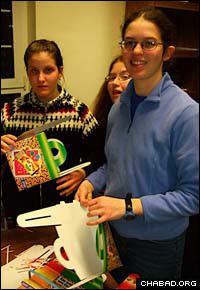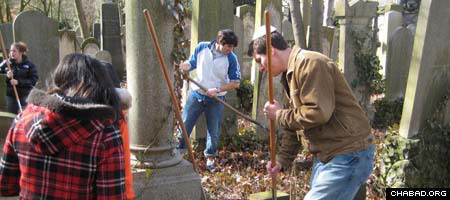The 25 Jewish college students who took part in a historic Spring Break trip to Berlin overcame financial difficulties and personal fears to make the journey. According to organizers, the city's Jewish community is better off for it.
"This trip demonstrated that yes, there is a future for Jewish life in Germany," proclaimed Rabbi Dovid Tiechtel, co-director of the Chabad Center for Jewish Student Life serving the University of Illinois at Urbana-Champaign, who coordinated the delegation.
The university-based rabbi came up with the idea for the trip after returning from last year's dedication ceremony of the new Rohr Chabad Center, which serves as the headquarters for Chabad-Lubavitch of Berlin, co-directed by Tiechtel's brother and sister-in-law Rabbi Yehuda and Leah Tiechtel.
During their week-long trip, the students cleaned up a Jewish cemetery, visited with residents of a Jewish home for the elderly, celebrated the dedication of a Torah scroll in Frankfurt, helped with Purim preparations and toured the remains of the Saschenhausen concentration camp. They also met with local political leaders, including Berlin's Senator of Interior Erhart Koerting and Monika Thiemen, mayor of Charlottenburg-Wilmersdorf.
Student Harrison Leibow said that spending Shabbat in a capital that once was the seat of Nazi power was a powerful experience. The Americans' German counterparts turned out for the occasion, and the two student delegations stayed at the Rohr Chabad Center's central synagogue for hours after the conclusion of Friday night services.
"Going into the trip, no one really could anticipate the impact that we were going to make on the Jewish community in Germany," said Leibow. "But, everyday we were in Germany, we saw another man smile in pride.
"The weird thing is, none of us realized how big of an impact the trip would make on us either," he continued. "It was a great trip, and I wouldn't trade it for any other."
Dovid Tiechtel stressed that the students not only gave up travel opportunities at such Spring Break resorts as Acapulco, Mexico, but that they fundraised for the Germany mission themselves.
"The financial undertaking was daunting," he explained, "and the parents of the students, as well as many of the students themselves, were apprehensive about a trip to the birthplace of Nazism.
"Nevertheless, beginning in September," added the rabbi, "the students took up the project, planned fundraisers and helped set the itinerary."

Following Shabbat in Berlin, the students went to Frankfurt Oder, a city on the German-Poland border where they participated in the dedication of a Torah scroll donated by Chabad-Lubavitch of Berlin in honor of the Americans' visit. The city was once home to one of Germany's largest Jewish communities before the Holocaust. After so many years of neglect, it is currently experiencing a Jewish revival.
"This was the first Torah dedicated to this community since the Holocaust," said Goldie Tiechtel, the rabbi's wife and fellow co-director of the Chabad Jewish Student Center. "Even more powerful, three of the students who had never had a bar mitzvah decided to use the opportunity to celebrate that milestone in their lives."
The next day, they went to a Jewish section of the oldest cemetery in Europe to clear overgrown weeds and return headstones, some from the 19th century, to their places. Later, they arranged a Purim event for the a Jewish day school in Berlin.
At Berlin's Jewish home for the elderly, they sang songs with the residents, many of whom are Holocaust survivors. One of the students played a Jewish song on her violin, bringing tears to some of the home's residents.
"I went to Germany not knowing what I was going to get out of it," said university student Sabrina Snowsky, "When the trip came to an end, I realized how much I learned about Judaism, Germany, Berlin and the Holocaust. But most important, I learned about myself. I took so much back from every activity, and I think this trip changed me for the best."
Boruch Wolf contributed to this article.





Start a Discussion